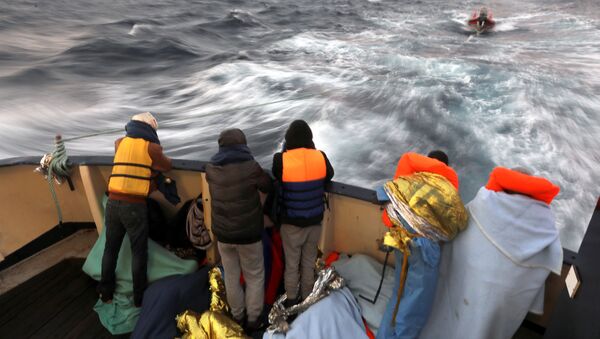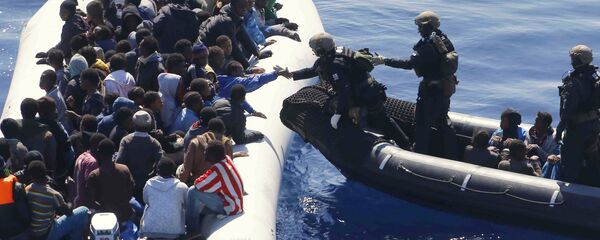More than 1750 Migrants Rescued as #Italy, #Libya Sign Deal pic.twitter.com/qfOiqhzf9c
— IntellectResistance (@IntelResist) February 3, 2017
Italian Prime Minister Paolo Gentiloni has signed the pact with Libya's Prime Minister Fayez al-Serraj in Rome.
#Italy’s Prime Minister @PaoloGentiloni signs agreement to help #Libya: development aid and fight against human trafficking, #migrantcrisis pic.twitter.com/5vlIvgSxB5
— Italy in US (@ItalyinUS) February 3, 2017
The deal is part of a wider plan to close off Europe's southern borders to the north African country and stem the flow of migrants before they embark on sea journeys during the warmer spring and summer months.
However, Gentiloni told reporters that the deal is part of a wider plan and that the European Union must make more of an "economic commitment," if it's to be a success. The agreement, he said, would see the Libyan Coast Guard join Italy in a "humanitarian repatriation" of migrants.
Here is the #MoU (in Italian) signed by #Italy and #Libya yesterday https://t.co/8YYf4Gd9OL #MaltaSummit #Migration #EU2017MT
— MariaTeresa Sette (@MTeresaSette) February 3, 2017
'Makes Good Sense'
Professor Anthony Glees, expert in politics, security and intelligence from the University of Buckingham, believes that the deal, in principle, "makes good sense, but shows the EU is beginning to think hard now about concrete ways of securing the EU's external borders with Arab North Africa."
However, Professor Glees does predict some difficulties with the deal.
"The difficulty in making a deal 'with Libya' is that there isn't really any single government or authority with whom one could do a deal but it's better than nothing," Professor Glees told Sputnik.
German Chancellor Angela Merkel, French President Francois Hollande and European Council President Donald Tusk have discussed the deal and have all agreed to support it.
.@eucopresident: "The #EU will support #Italy and #Libya with additional #EUfunds for the #migration situation"#MaltaSummit #EU2017MT pic.twitter.com/HEnRvTUGaX
— Paragon Europe (@ParagonEurope) February 3, 2017
"The bottom line is that now, after Brexit, securing the external border of the EU will be absolutely vital if the EU is going to be able to regain its geopolitical stability," Professor Glees said, adding that refugees must "continue to be allowed an opportunity to find a safe haven."
"But that safe haven cannot be the EU itself," he said, suggesting that "if this deal works," Turkey and perhaps Libya, "should be site of first-rate displaced person camps."
'Thinly Veiled Plan'
Meanwhile, human rights organization Amnesty International (AI) has called the plan "callous."
"This plan is just the latest, but perhaps the most callous indicator of European leaders turning their back on refugees," Iverna McGowan, director of AI's European Institutions Office said.
We will strongly resist #EU agreement to block #refugees & migrants in Libya, which we know will lead to horrendous suffering. #MaltaSummit pic.twitter.com/Md0JZw2gEw
— Amnesty EU (@AmnestyEU) February 3, 2017
"The proposal to pull back EU naval operations from search and rescue activities and encourage — and indirectly fund — the Libyan coast guard to plug the gap, is a thinly veiled plan to prevent refugees and migrants reaching Europe.
"It will trap tens of thousands of people in conflict ravaged country and expose them to the risk of torture and exploitation," McGowan added.
The deal is part of a wider plan to close off Europe's southern borders to the north African country and stem the flow of migrants before they embark on sea journeys during the warmer spring and summer months.




